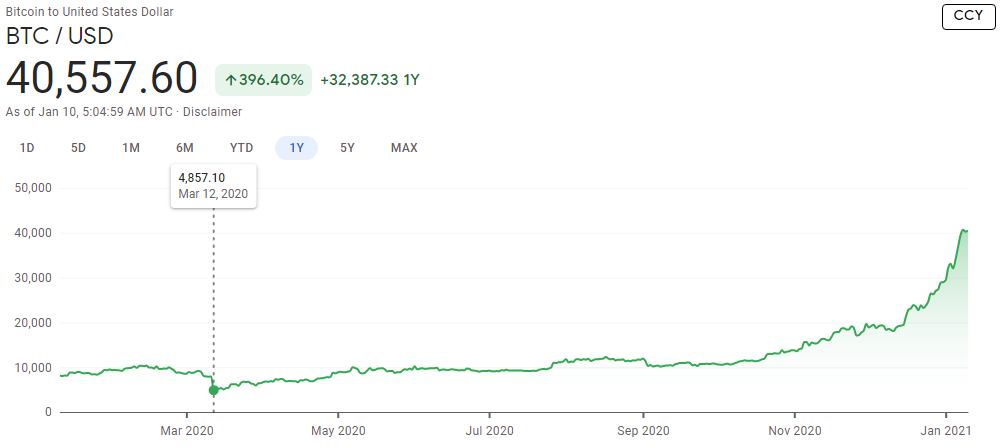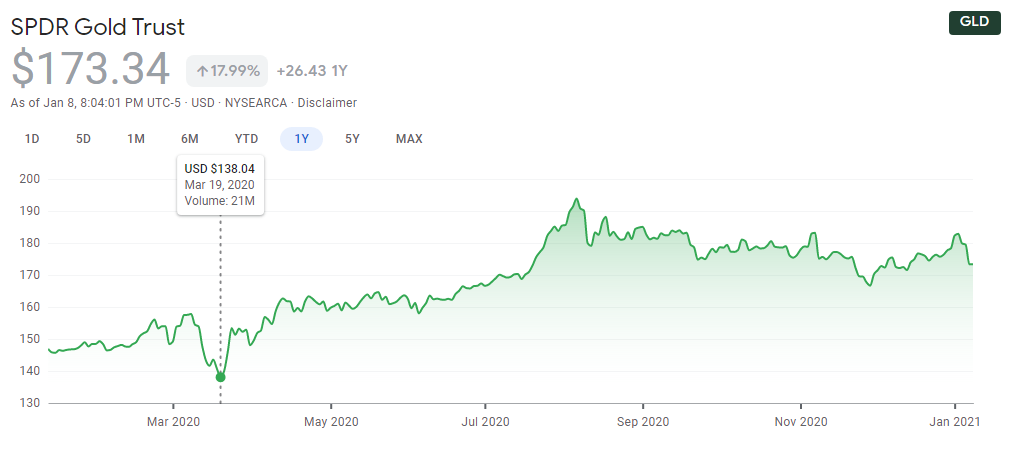Bitcoin Versus Gold
The gist of this article is to explain in clear English why bitcoin has outperformed gold and makes a more viable currency. I’m not going to speculate on price movements rather the utility of the currency. If you’re an older reader pay closer attention, bitcoin is no longer just “an idea in a geek’s head”.
The Charts

BTC/USD 1 Year to Jan 9, 2021

SPRD Gold Trust Price 1 year history ending on Jan 9, 2021
Why has Bitcoin Outperformed?
So why has bitcoin outperformed gold in the past year? The charts above show bitcoin and a gold ETF side by side and as you can site bitcoin is the clear winner. My answer is in the form of a question.
“How would you use gold to buy what you buy in a given year?” How can you use gold to buy pizza, how can you use gold to order items online, and how can you use gold on the go anywhere you are?
The answers are clear, you can’t. If you do, you’ll probably lose value, for example you can give a store clerk a gold coin and he’ll pocket it and then pay from his pocket because he just ripped you off, but he won’t go through the rigamarole of checking the spot price of gold and empty out his cash register to make it a fair transaction. Regarding online orders, forget it. It’s really dangerous and stupid to be carrying gold coins with you everywhere you go.
Now pose the same question with bitcoin. Well, in some foreign countries such as Japan I can buy pizza with bitcoin. The US is still catching on so most restaurants and stores will not accept bitcoin. Many websites accept bitcoin, a long time WordPress started accepting bitcoin and others followed such as Steam, Reddit, Microsoft, AT&T. The biggest news of all I think is that Paypal will allow spending in local currencies with bitcoin. So you go anywhere in the world, imagine being able to spend in local currencies being converted out of bitcoin and a real-time rate. Amazing right? All you need is your phone, something undoubtedly you have either in your hand or pocket right now. Good luck bringing gold overseas, even locally TSA questions people that move gold around but if you go overseas you may be subject to paying a tariff to bring in gold.
What should I do if I have Gold?

If you have gold don’t worry, I think gold prices will keep going up in the medium and long term. A short term fall is most likely institutions rebalancing as they add bitcoin to their portfolio. Institutions need to have bitcoin in reserve if they offer their customers the option to buy bitcoin on their platform. Gold does have a few benefits over bitcoin, including it’s time earned reputation as a store of value. A digital coin that’s been around for a little more than 10 years is not going to replace gold as the “gold standard”, and you are protecting yourself against inflation. Gold also has the title of being anonymous. As long as people aren’t writing down serial numbers of coins or bars they trade, gold can be untraceable. Bitcoin used to have that distinction but since it uses a public ledger if folks reuse their same bitcoin addresses its possible to trace down where addresses belong using some tricky sleuthing. Also, many people are keeping bitcoin on online wallets that are hosted by companies rather than keeping it in cold storage on hard drives. That means users don’t really own the wallets they are using a service to manage a wallet that then creates sudo wallets when transactions are performed.
You’ll want to make precautions to make sure you don’t get your gold lost or stolen, gold thankfully has elemental properties that prevent it from decaying or becoming dull over time. That being said, I feel it’s value as a currency are less than bitcoin so treat it more as a hard asset investment (much like real estate except without the power to cash flow). I’m going to get to preferred investments later.
What should I do if I have Bitcoin?
If you have bitcoin congratulations, you’ve probably already made a killer profit. That being said bitcoin is still growing as a currency and most folks that are older and less technology savvy may be less likely to “catch on”. However, the great thing about bitcoin is it is a deflationary currency meaning it has a hard supply cap and the mining becomes more difficult over time. Higher demand with limited supply will lead to higher prices, however a pullback from the recent price spike is very possible. What I would do if I did not already own real estate is sell enough bitcoin to make sure you own your primary residence. If you have a lot of bitcoin I’d also sell more to buy rental properties which pay back the mortgage and then some. Throughout time mankind has had great success in making fortunes from supplying housing to folks for a price. You are doing tenants a service by providing housing at a price they are willing to pay and they do not have to buy an entire house or deal with some struggles that come with owning properties such as maintenance, taxes, insurance. I wouldn’t sell it all though because during a rising period it’s hard to be certain how high bitcoin will go. Will it stop at $50,000 or continue it’s way to $1,000,000? With a max supply of 21 million coins a 1 trillion dollar total capitalization would mean each coin is worth $47,619. Does the world place that much value on this cryptocurrency? My guess is yes, and if bitcoin pulls back to less than $20,000 I will be dollar cost average purchasing more with each paycheck.
The Paycheck Conversion Plan
I learned of this when I lived in Malaysia. The Malaysia ringgit was getting hit hard with low oil prices and political issues, lines would form around all the currency traders (which were prevalent also because of lots of tourism). Locals would exchange their hard earned ringgit for either USD (US Dollars), SGD (Singapore Dollars), or RMB (Chinese Money). The reason for this was to prevent their money losing value as fast as it would otherwise. Also because they trusted the other currencies more.
I think it’s a great painless and stress free way of purchasing something your brain construes as “expensive” over time. Kind of like getting into the ocean inch by inch rather than taking a dive. Budget yourself, how much you need for your life and how much you use for investing. Divide your investing into stocks,real estate, and crypto. Divide your crypto into Bitcoin, Etherium, Litecoin, and any other coins you deem worthy (read the white papers and do so checking on how easy these coins are to mine and what they are already used for). After you come up with that percentage multiply it by your wages (be it bi-weekly, monthly, etc) and then set a recurring purchase transaction on a website like Coinbase (join using this link to get $10 free bitcoin for you and me) for all the coins you’ve come up in your list.
I hope this has been helpful, please subscribe to our free mailing list.
https://www.facebook.com/TheHighestReturn





